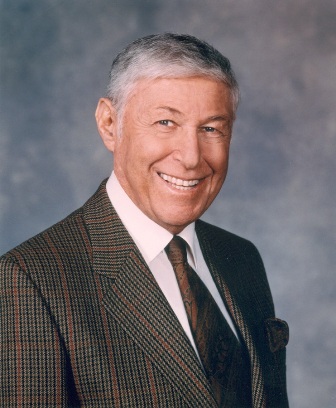 On Tuesday, September 24, 1968, the now legendary ticking stopwatch, first appeared in New York on CBS, followed by correspondent Harry Reasoner saying to the camera, “Good Evening. This is 60 Minutes.â€
On Tuesday, September 24, 1968, the now legendary ticking stopwatch, first appeared in New York on CBS, followed by correspondent Harry Reasoner saying to the camera, “Good Evening. This is 60 Minutes.â€
Since its debut over four decades ago, Don Hewitt’s creation has revolutionized the face of the modern news broadcast and been copied by news organizations around the world, including the American media in the form of “Dateline,†“20/20,†“Nightline†and its sister show on CBS, “60 Minutes II.â€
Hewitt unashamedly based his show on the dominant publication of the time, Life magazine and its content was a combination of interviews with entertainers alongside the investigative expose of political and corporate misdeeds.
Born Donald Shepard Hewitt on December 14, 1922 in New York City, he grew up in Boston and New Rochelle, NY. He dropped out of New York University to work as a copy boy at the New York Herald Tribune before joining the Stars and Stripes newspaper covering the U.S. Merchant Marines during World War II.
Hewitt, famously recalled asking, “What-avision?,†when he was told of CBS looking for someone with picture experience for their new television programming after the end of the war. By the time, he had shot the exclusive footage of the sinking of the luxury cruise ship, the Andrea Doria in 1956, he had already been producing and directing television shows for legendary CBS journalist Edward R. Murrow.
Differences with the other CBS heavy-weight, Walter Cronkite over the direction of the “CBS Evening News†led to his removal as executive producer of that show in 1964 and exile to the documentary unit. He, however, managed to produce one of his best shows during this period, when he arranged for Cronkite to interview Frank Sinatra in an in-depth documentary.
With Hewitt at the helm, “60 Minutes†was a top 10 television show for 23 consecutive years (1977-2000) and was also the only show to be rated No. 1 in three consecutive decades. The show also won 73 Emmys, 13 DuPont/Columbia University Awards and 9 Peabody Awards during his thirty-six year stay.
He and the journalists working at the show like Mike Wallace, Morley Safer, Ed Bradley, Dan Rather, Andy Rooney and Lesley Stahl, among many others were almost as well-known to their viewers as the people they interviewed, like Ayatollah Khomeini, Barbara Streisand, Bill and Hillary Clinton, and Michael Jackson.
Famous for his many verbal battles with his own journalists for control of the show, Hewitt saw himself as the ringmaster for “The Greatest Show On Earth.â€
Friend and long time competitor, Barbara Walters saw him not as a news snob, but an editor and producer with a common touch, who could relate to the people.
On being asked about the success of the show after stepping down in 2004, he replied, “ The secret of this broadcast is the ability to find people who could tell their own story better than you can, and your job is to bring it out of them.â€
Hewitt and “ 60 Minutes†also found themselves as the lead story on a quite a few occasions, like the 1998 footage of Dr. Jack Kevorkian lethally injecting a patient, prompted the heated discussion of euthanasia in America and the ethical boundaries of a television news show.
The darkest period in his career came in 1995 when the CBS management with Hewitt’s approval, decided to stop the airing of an interview with a tobacco industry insider about the effects of nicotine addiction to prevent a multi- billion dollar lawsuit. The report later was published by the Wall Street Journal and also made into a film, “The Insiderâ€(1999), which further tarnished his reputation.
Hewitt, who died on August 19, 2009 at his Bridgehampton, N.Y. home of pancreatic cancer, is survived by his third wife, Marilyn Berger and four children from his earlier marriages.
In addition to creating “60 Minutes†and producing the news shows of Murrow and Cronkite, Hewitt was responsible for CBS’s coverage of the ground breaking first presidential debate between Richard M. Nixon and John F. Kennedy in 1960. He also oversaw Cronkite’s reporting of the Kennedy assassination in 1963 and the NASA space missions of the late ‘60s.
In his 2001 autobiography, ‘Tell Me a Story: Fifty Years and 60 Minutes in Television,†Hewitt wrote, “The formula is simple, and its reduced to four words every kid in the world knows: Tell me a story. It’s that easy.â€

Leave a Reply